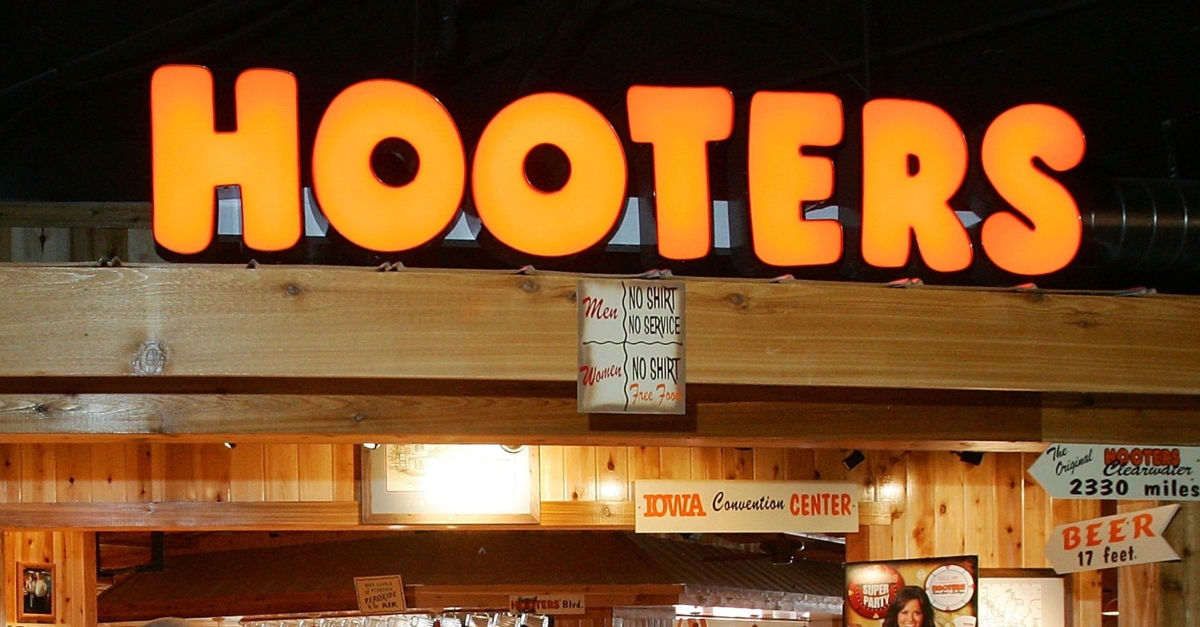
Photo via Ethan Miller (Getty Images)
Restaurant chain Hooters is facing a civil rights lawsuit alleging that its location in Metairie, Louisiana, discriminated against Black or darker-skinned “Hooters Girls” when it rehired only light-skinned employees after pandemic-related layoffs ended.
Hooters — one of the nation’s best-known so-called “breastaurant” chains — is no stranger to lawsuits alleging gender discrimination, racial discrimination, and sexual harassment.
According to the recent lawsuit, five Black employees were laid off from the Metairie location at the start of the COVID-19 pandemic in March 2020. By May 2020, though, Hooters began to recall some of the workers — all of whom were white.
“As of June 11, 2020, the Metairie restaurant had retained, recalled, or hired a total of 26 employees, none of whom was Black,” alleges the complaint.
The Black employees who had been laid off knew of the recalls and say they made formal complaints via the company’s corporate hotline.
The complaint also argues that race-based discrimination started long before 2020. Black servers, hostesses, and bartenders were subjected to “frequent demeaning and offensive remarks based on race,” from at least 2017, according to the court filing. The complaint further asserts that darker-skinned Hooters Girls “experienced racial hostility and observed preferential treatment of White employees while employed at the restaurant” and received less favorable shifts.
The U.S. Equal Employment Opportunity Commission (EEOC) filed a federal lawsuit against Hooters of America, LLC in late July alleging that the North Carolina chain violated Title VII of the Civil Rights Act of 1964, which protects individuals from workplace discrimination and harassment. The ten-page complaint was filed in U.S. District Court for the Middle District of North Carolina only after the EEOC and Hooters were unsuccessful in settling the dispute out of court.
The EEOC now asks for the court to not only order Hooters to end any future unlawful conduct, but also to compensate the employees for all damages including back pay, and to impose punitive damages on the restaurant.
Read Related Also: Hoppers Crossing, Melbourne: Major crime scene set up
“When recalling employees from a layoff, it is critical that employers examine their selection criteria to ensure they are objectively verifiable and free from racial bias,” Melinda C. Dugas, regional attorney for the EEOC’s Charlotte District, said in a statement.
“Federal law protects employees from race-based decision making in the terms of employment, including in layoff, recall and hiring decisions,” Charlotte District Director Betsy Rader noted. “Title VII of the Civil Rights Act of 1964 also prohibits employment decisions based on color, including discrimination based on the lightness or darkness of a person’s skin shade or tone.”
Hooters has come under fire many times for its employment practices, as part of which the company staffs its restaurants with young women wearing provocative clothing. The company has over 300 U.S. locations.
In 1997, Hooters notoriously defended an employment lawsuit brought by would-be male waiters who alleged they had been the victims of sex discrimination. The restaurant raised what is known as the “BFOQ defense” — an exception to federal anti-discrimination law that allows an employer to consider religion, sex, or national origin if those characteristics constitute a “bona fide occupational qualification reasonably necessary to the normal operation of that particular business or enterprise.”
Ultimately, the waiters’ lawsuit ended with Hooters paying out millions in settlement money to the plaintiffs. The BFOQ defense does not apply to discriminatory practices relating to race. However, the line between race-based practices (which are prohibited) and those relating more generally to “physical characteristics” (which are sometimes allowable) is sometimes hard to draw.
For example, a federal appeals court upheld an employer’s right to prohibit the wearing of dreadlocks in the workplace despite the style’s close ties to racial identity.
The lawsuit is proceeding before Barack Obama appointee Chief U.S. District Judge Nannette Jolivette Brown. The parties are due in court on Monday to discuss a possible settlement. Counsel for the parties did not immediately respond to request for comment.
Have a tip we should know? [email protected]







